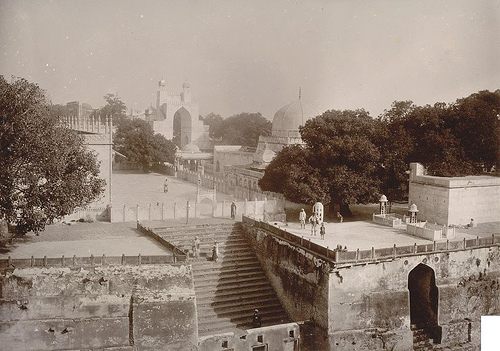Category Archives: Teachers (Other)
Alastu Bi-Rabbikum–Am I Not Your Lord?
- Those spirits that on hearing their Lord’s call fell into sajdah (prostration) replying with heart and limb, “Balaa (Indeed)!”
- Those that made sajdah but didn’t do so with any sincerity.
- Those that believed sincerely with their hearts only.
- Those that didn’t care to reply–neither with heart nor limb.
The khwaja, may God have mercy on him, then clarified each category.
Translated by Sharaaz Khan
9 Rajab 1432 Hijri
The Prayer of the Aspirant
Visiting the Holy Prophet (Peace Be Upon Him)
February 1, 2004 / Dhul Hijjah 1424
Volume 1, Issue 4
Visiting the Holy Prophet (Peace Be Upon Him) is the best of all devotions and recommended acts. As a matter of fact it is from those necessary acts of worship which are obligatory for us to perform because the Holy Prophet (Peace Be Upon Him) emphatically urged us to desire it.
He (Peace Be Upon Him) said:
“For whom it is possible to visit Me and he or she still does not do so, has committed a great injustice against Me.â€
He (Peace Be Upon Him) also said:
“Whoever visited My honorable grave, My intercession becomes incumbent upon him or her.â€
He (Peace Be Upon Him) also said:
“Whoever visited Me after My passing onto the next realm, it is like he or she visited Me in my life.â€
And there are Ahaadeeth (sayings of the Holy Prophet (Peace Be Upon Him)) besides these.
According to the scholars, it is proven that the Holy Prophet (Peace Be Upon Him) is alive and is given sustenance and is enjoying worship; however people who are unable to reach these high stations, the Holy Prophet (Peace Be Upon Him) is hidden from their eyes.
And when we saw many people unaware of the right a visitation requires and its details (in its entirety and small portions, obligations and recommendations) which are sunan (the Way of the Holy Prophet (Peace Be Upon Him)) for visitors, we wanted to write the “Etiquette of Visitation†after completing the topic of Hajj to complete the usefulness of this book.
So we say that one who is intending to visit the Holy Prophet (Peace Be Upon Him), this person should send Darood Shareef (noble prayers on the Prophet (Peace Be Upon Him)) in abundance as a gift to the Holy Prophet (Peace Be Upon Him) because He (Peace Be Upon Him) listens and this is conveyed to Him (Peace Be Upon Him) and the virtues of Darood Shareef are so famous that they don’t need to be mentioned here.
When we see the walls of Madinah, the Pure, start reciting Darood Shareef and say: “O Allah! This is the Blessed Sanctuary of Your Messenger (Peace Be Upon Him) and Keeper of Your Revelation. So send me Your favors so I can enter into it, make it the cause of safety for me from Hell and punishment and make me among the people who will be awarded intercession of the Noble Prophet (Peace Be Upon Him) on the Day of Reckoning!â€
Before entering Madinah, the Pure, or after entering it, but before visiting the Holy Prophet (Peace Be Upon Him), if possible, take a shower, wear perfume and nice clothes. He should do this out of respect for presenting himself in the Presence of the Holy Prophet (Peace Be Upon Him). After this when his companions are settled in one place and he is at peace regarding his family and luggage etc., then, keeping in mind the awesomeness of the place, with calm and dignity, enter the city reciting these words if possible:
“I enter with the Name of Allah, Most Exalted, Most High and upon the community of the Noble Messenger (Peace Be Upon Him). O my Lord! Enter me with a good entrance, and bring out good, and bless me with energy and help from You. O Allah! Send blessings on our leader Hazrat Muhammad Mustafa (Peace Be Upon Him) and His followers. (Read Darood Shareef till the end.) Forgive my sins and open the doors of Your Mercy and Blessings for me.â€
After entering the Noble Mosque of the Holy Prophet (Peace Be Upon Him) pray two cycles near His Noble Pulpit and stand there in such a way that the handle of the Pulpit is next to your right shoulder. The Holy Prophet (Peace Be Upon Him) used to stand here.
And there are gardens of paradise between the Holy Prophet’s (Peace Be Upon Him) Illumniated Grave and Noble Pulpit. As the Holy Prophet (Peace Be Upon Him) has informed us about it:
“My Pulpit is on My Basinâ€
In addition to the Tahiyyatul–Masjid (2 cycles offered upon entering a mosque out of respect for it), read two cycles of prayer of Shukr (gratitude) because Allah Almighty endowed you with the tawfeeq (success) to come here and granted you the favor of bringing you here.
The above piece was translated from the famous Hanafi Fiqh Text “Noor-ul-Idah†by Ayyaz Yousaf Qadri, Managing Director of IECRC.








